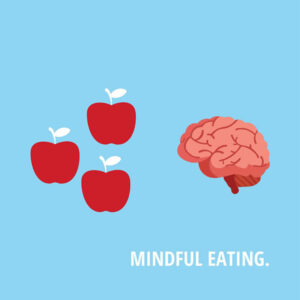Do you notice eating?
I’m guessing your mind is usually on something
other then food when you’re eating.
Perhaps you work through your lunch ‘break’, perhaps you watch something, or get engrossed in conversation, or flick through social media, or read or just zone out. We often hardly notice the food that we are placing in our mouths and eating. It is one of the great pleasures in life and we are asleep during it. You may miss out on enjoying the food you have just made, or paid for, and you are far more likely to over-eat.
Chew, chew, chew
When we eat mindlessly, we often almost inhale our food; we take big bites and we don’t chew enough. Chewing is the first stage of our digestion, but do we chew effectively? Rarely. Take smaller bites and chew, chew, chew. You need to slow down, intentionally taking smaller bites, chew adequately. As well as learning to mindfully eat you can even often eliminate digestion problems!
Are you hungry?
It is a skill to be aware of our bodies and notice whether we are truly hungry or not. We need to learn to be aware of when we’ve had enough to eat and it’s time to stop. Are you merely looking for a boost of energy or a change to your mood, if so you need to think through and investigate what is going on. Are you reaching for a sugar energy hit or comfort carbs? Do you need more sleep? Do you need to take more windows out of your fast pace to recharge? Are you stressed, do you actually instead of eating, need to address your stress? It is such a good starting point if you can figure out that you’re actually reaching for food as a quick fix for a different problem altogether.
When you emotionally eat you actually zone out
Once we learn that we are actually eating for emotional reasons, we need to understand more this coping mechanism. Emotional eating works to soothe or dull our problem emotions because it actually is a process of us zoning out. We disappear from our headpace and our emotions. Emotional eating is like a pause button. But then we unpause it, and we are back at square one, with our problems sitting there ready to headbutt us again. On top of it, we then have our regret from what we have just mindlessly eaten. We usually only taste the first mouthful, and then as long as we can keep shovelling food into our mouths we can disconnect from our negative thoughts and emotions. It is the same ‘disappearing’ that we do with shopping, gambling, drinking, smoking, drugs; we are self-medicating. A great start is to write down how you are feeling and thinking. Let’s start working to process and address your problem areas.
We can also learn comfort eating as a coping mechanism from our childhood. As a child when you were sick or unhappy, family may have offered you comfort food. Now as an adult, comfort food may be your go-to when you are feeling sad or anxious. What are your patterns? When do you comfort eat? Over what kind of stressors? What are your go-to comfort foods? What patterns can you look out for so that you can make a conscious choice in the future?
We can learn to act when our uncomfortable emotions trigger our urge to eat mindlessly and unhealthfully. Remember, in the moment you can actually choose your response. How you respond will shape your relationship with food and your body.
Only eat sexy food
Our family often jokes that we only eat ‘sexy food’. But this is actually true; we eat food that is exciting in its quality, simplicity, nutritional value and care in being prepared. Simple is fine. Simple food is often in itself a beautiful thing, as long as it is of good quality and has mixed colours and lovely flavour. We need to slow down our relationship with food so that we have intent and enjoyment.
Tricks to stay awake to mindful eating
1. Before you eat, take a moment to notice what is going on for you. Are you feeling stressed or relaxed? What is your mood? What are you thinking? Are you feeling anxious, sad or irritated? What is eating doing for you right now? Do you need food or are you simply escaping from your problems?
2. Always sit down. Don’t eat on the go. This helps us appreciate our food.
3. Take away distractions while eating. Eating is a conversation between you and your food. Attend to it. Have a rule: no working while eating. Take yourself away from your usual workspace to eat. No screens while eating. Just take a moment out for yourself to notice and enjoy eating.
4. When possible, eat with nice plates and glasses. They do not cost much, and they enhance the meal. Especially don’t eat mindlessly out of a bag.
5. Serve out portions that would fit on a bread-and-butter plate. That is plenty. Even serve it on this smaller plate if you choose. This also helps you to know what you are eating. It takes away the ‘finish everything on your plate’ problem, as you won’t have as much on your plate to begin with. And no, to make the point, we do not have to finish everything on our plate; the negative impact on our bodies of overeating is more important than the problem of seeing food wasted.
6. Try to slow down your eating by cutting your food up more, eating with cutlery when you normally might not. Even eat more with chopsticks if that works for you. Put down your cutlery between bites or at regular intervals.
7. Notice how your stomach is feeling, then rest for a bit and let the food reach your stomach. Your stomach may literally be so stretched that it has become desensitised to the sensation of fullness. It might take some time of more moderate-sized meals for your stomach to recover and start functioning so that it can gauge its fullness.
8. While eating, have gratitude for the meal; think about and appreciate where the ingredients came from and the long chain of people who have prepared it for you (the seed company, the farmers, the pickers, the packagers, the finance people, the marketers, the transporters, the shop managers, shop workers and all of the family members who supported these people to go do their work roles). All for the food on your plate. Have gratitude that you have the food, the moment to eat, and the surroundings around you.
Food is fuel. You would not put the wrong fuel in your car because then your car would not run. It’s the same with your body. If you transfer even a quarter of these mindful eating skills to your day-to-day eating, then you are miles ahead. You will enjoy your food. Only eat quality food, and only eat with intention and when you are hungry.



Subscribe To Our Newsletter
Join our mailing list to receive Psych wisdom, advice and encouragement once a month.
"The Skills we need are not just common sense, we need to learn them from somewhere"
You have Successfully Subscribed!